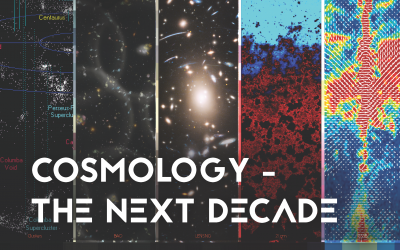The great observational progress in cosmology has revealed some very intriguing puzzles, the most important of which are the existence of new mysterious components of the Universe: the dark matter and the dark energy. While a standard model of cosmology — the Lambda cold dark matter (LCDM) paradigm — has emerged, many puzzles are as yet unsolved. Is dark energy really just a cosmological constant (Lambda), or is it something dynamical, perhaps even a clue that Einstein’s general relativity needs modifications at cosmological scales? Is dark matter a new particle beyond the Standard Model, and do its microscopic properties leave any imprint at cosmological or galactic scales (e.g., deep inside galaxy clusters, or in dwarf galaxies)? The nature of dark matter would also have very interesting consequences for the reionization history of the Universe, which is already being constrained by observations of high redshift quasars and galaxies and is expected to be determined in considerable detail by upcoming and future 21cm experiments.
This is therefore a very exciting time in cosmology as we make new proposals for cosmological experiments and wait for the next generation of the already approved experiments to become operational. The nature of data that will be provided by the next generation of cosmological experiments would be overwhelming quantitatively (in the case of large scale structure surveys) and very different from the current data sets qualitatively (in the case of the CMB spectral distortions and polarization and 21 cm experiments). There are also large gaps — mainly driven by astrophysical uncertainties in our theoretical understanding of the large scale structure; these must be filled in order to get the full benefit of these new data sets.
This is the backdrop against which we plan to have the School and Workshop to explore and discuss these issues as we look forward to another 10 exciting years in cosmology.
The topics covered in the School will include:
- Cosmological perturbation theory and CMB anisotropies
- Growth of cosmological LSS and the Cosmic Web
- Gravitational lensing
- 21cm physics
- Galaxy formation and evolution
- Galaxy clusters
- CMB spectral distortions
- Large-scale relativistic effects in the observed LSS
- Astro-particle physics, dark matter detection and neutrino cosmology
- Cross-correlations between observational probes
- Numerical simulations
- Gravitational wave physics and cosmology
The Workshop will bring together a larger number of scientists working in these and related areas for a more advanced discussion of the latest developments in these and related areas.
In addition, as part of the workshop, there will be one day (a Survey Day) reserved for detailed discussion current and upcoming large scale structure and CMB experiments, especially keeping mind core Indian involvement to specific missions and surveys.
As part of the program there will be Infosys - ICTS Chandrasekhar Lectures by Prof. Rashid Sunyaev, ICTS Distinguished lectures by Prof. Richard Bond and ICTS Vishveshwara lecture by Prof. Lyman Page.
Eligibility Criteria :
School - Ph.D and advanced undergrads+masters students, Postdocs, Faculty from Indian Universities.
Workshop - Active researchers, Faculty, Postdocs and PhD students.
Accommodation for outstation participants will be provided at our ICTS campus guest house.
 icts
icts res
res in
in

